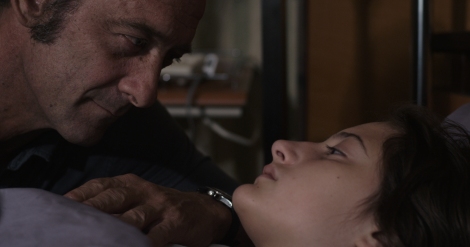
What: Film Review
Directed by: Claire Denis
Written by: Jean-Pol Fargeau and Claire Denis
Produced by: Brahim Chioua, Laurence Clerc, Olivier Thery-Lapiney
Starring: Vincent Lindon, Chiara Mastroianni, Lola Creton, Michel Subor, Julie Bataille
Running Time (in min.): 83 minutes
Language: French w/ English subtitles
Rating: Not Rated
Official Selection of The 51st New York Film Festival
How far film has come since the days of delightful Busby Berkeley movies and empowering Dziga Vertov ethnography. The disjuncture between nostalgia and “nowadays” is exposed quite literally in the feelings that come from Claire Denis’s latest feature. The French auteur’s Les salauds, set for international release as Bastards, calls our attention to just how significantly the cinema has changed from a “take your family for a night on the town” kind of event to a “don’t let anyone younger than you see this” type of thing.
This is tricky territory for all but Denis, who returns here to a visceral, gripping style that seemed absent from her sad, calm 2009 feature White Material. From her own script with frequent partner Jean-Pol Fargeau, Denis ventures into the Parisian underground with the early self-defenestration of a wealthy businessman (Christophe Miossec) in the dead of some night. In another part of the city, a disturbed young woman (ingénue Lola Creton, of Something in the Air) walks fully nude – except for two very high-heeled shoes. These two events call to attention the captain of a commercial cargo ship circling Dubai played by the great, craggy Vincent Lindon.

Age has done the star of La Moustache well, and here, as the uncle of the unwell nudist, he delivers his strongest performance since that film in 2005. Lindon’s Marco quits his job on the high seas and takes an apartment just below Edouard and Raphaelle Laport (the stellar Michel Subor, also aging beautifully, and Chiara Mastroianni), who may or may not be implicated in Marco’s brother’s suicide. Denis straddles beautifully the line between clichés and novelty, setting us up for the inevitable sexual chemistry between Mastroianni and Lindon without much fuss. The two French stars are well-matched to one another, buzzing with a combination of mistrust, disregard, and feral lust.
And so we are brought once again into a world that simultaneously thrills and disgusts us. As per her usual specialties, Denis does not hesitate to draw strong parallels between sex of an affectionate nature and that of a more abusive tone. Most impressive here is her presentation of expected violence, which Marco embodies as a man brought against his own instincts into the seedy noir belly of Paris. Lindon is called upon to get physical with several assailants, and even some allies, most often his niece’s inept doctor, Bethanie (Denis regular Alex Descas, 35 Shots of Rum.) In these scenes, Marco is only as valuable as the precisely brutal sound effects from Martin Boissau and Christophe Winding, who deliver an approximated realism that every action flick could learn a thing or two from.

Yet Denis leans heavily and appropriately once again on her genius cinematographer Agnes Godard, whose command of the moving image makes Bastards more of a pleasure than this review can suggest. Godard’s work here skews towards the hellish, creating a locale that stands in complete opposite to France’s less accomplished, Best Foreign Language Film submission Renoir (2013; Notably, the opposite is true in the Official Selection of the 2013 Cannes Film Festival, where Denis was nominated for the Palme D’Or, the New York Film Festival, and the French Cinema Now screenings hosted by the San Francisco Film Society in November 2013) While it’s no challenge to imagine why that film – a biopic of the late, great visual artist – would be called upon to appeal to the Academy’s tastes, Godard’s magnificent photography calls that choice into question.
Draining Paris of its pleasurable light, Denis’s characters talk and walk through dirty-looking greens and blues, hued as if underwater. Godard is particularly attentive to the lighting on Mastroianni and Creton, both of whom deliver courageously nasty performances given the circumstances. If Denis perhaps treats both characters in typical neo-noir fashions, the actors stand up straight under the duress that their immoral, sexually complicated characters must embody. Once again, in theirs and Lindon’s superb work, Denis proves herself as much a master as Godard at her craft, sculpting actors as Bresson might have – her conduits for a dark, moody vision. So it’s neither surprise nor displeasure that, even though Bastards runs on murder, rape, adultery, incest, prostitution and poverty, more Claire Denis means more happy cinephiles.

